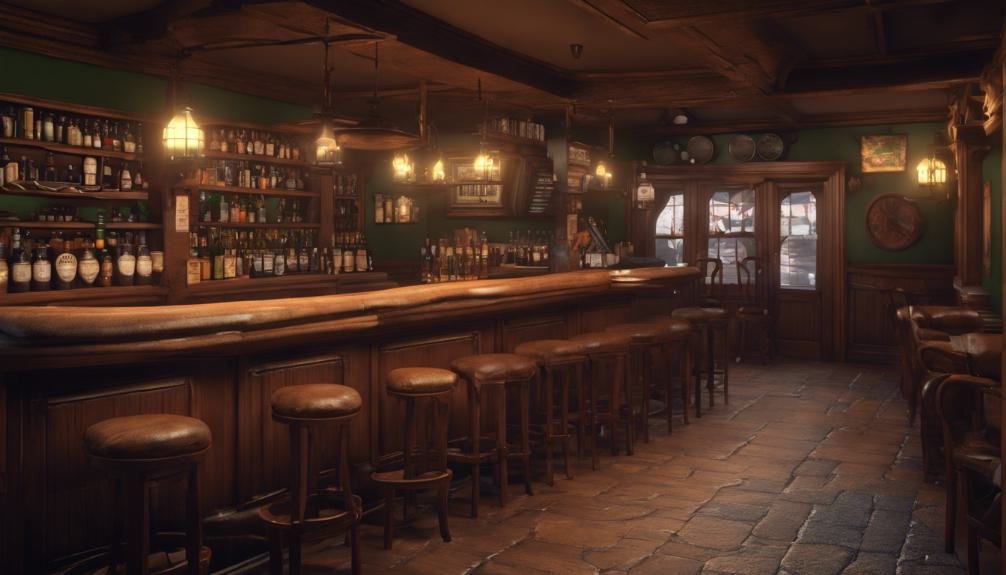Starting a Food and Beverage Business in Ireland
When starting a food and beverage business in Ireland, conduct thorough market research to tailor your offerings effectively. Understand consumer preferences, local tastes, and buying behaviors. Guarantee compliance with licensing, health, safety, and food regulations. Develop a solid business plan with financial projections and operational logistics. Carefully select your location based on foot traffic, accessibility, and competition. Partner with local suppliers for fresh ingredients, adjust your menu seasonally, and focus on branding and marketing efforts for brand awareness. Consider various funding options to secure financial support. Invest in staff recruitment, training, and positive work culture. Implement sustainability practices for environmental impact.
Key Takeaways
- Obtain necessary licenses and permits to comply with regulations.
- Conduct thorough market research to understand consumer preferences.
- Develop a menu aligned with local tastes and dietary trends.
- Consider location factors like foot traffic and competition.
- Implement sustainability practices for environmental responsibility.
Market Research
Conduct thorough market research to identify opportunities and assess the competitive landscape before launching your food and beverage business in Ireland. Understanding consumer preferences is key to tailoring your offerings to meet the market demand effectively. Investigate the local tastes, dietary trends, and buying behaviors to align your products with what customers are seeking.
Competitor analysis is essential in positioning your business for success. Identify who your main competitors are, analyze their strengths and weaknesses, and determine what sets your business apart. By understanding your competitors, you can develop strategies to differentiate your offerings and create a unique value proposition that resonates with your target market.
Utilize surveys, focus groups, and online research to gather relevant data on consumer preferences and competitor strategies. This information will provide valuable insights to help you make informed decisions about product development, pricing, and marketing strategies.
Legal Requirements
To successfully start your food and beverage business in Ireland, you must understand the key legal requirements. These include obtaining the necessary licenses and permits, ensuring compliance with health and safety regulations, and adhering to strict food regulations.
Licensing and Permits
How can you guarantee compliance with the necessary licensing and permit requirements when starting your food and beverage business in Ireland?
To ensure you meet all legal obligations, begin by understanding the permit application process and licensing fees involved. The permit application process typically involves submitting detailed documentation about your business, including premises information, food safety protocols, and waste disposal plans.
It's important to complete these forms accurately and submit them in a timely manner to prevent delays in obtaining your permits.
When it comes to licensing fees, be prepared to budget for these costs as they can vary depending on the type of license required for your specific business activities. Research the different types of licenses available and determine which ones are applicable to your operations.
Health and Safety
Understanding the legal requirements for health and safety is imperative when establishing your food and beverage business in Ireland. Maintaining high hygiene standards is essential to guarantee the safety of your customers and compliance with regulations. Regular staff training on proper food handling practices and sanitation procedures is critical to prevent foodborne illnesses and maintain a healthy environment.
Conducting thorough risk assessments is another key aspect of health and safety in your establishment. Identifying potential hazards in the workplace, such as slippery floors or faulty equipment, and taking proactive measures to mitigate these risks is essential to protect both your employees and customers.
Additionally, having well-defined emergency procedures in place is necessary to handle unexpected situations effectively. Establishing protocols for incidents like fires, injuries, or food contamination can minimize harm and ensure a swift response when emergencies arise.
Food Regulations
Maintaining adherence to food regulations is essential for your food and beverage business in Ireland to guarantee safe and high-quality products for your customers. In order to navigate the complex landscape of food regulations effectively, it's important to pay close attention to details such as food labeling and product testing.
Here are some key points to keep in mind:
- Food Labeling: Make sure that all products are labeled accurately with ingredients, nutritional information, allergen warnings, and any other required details.
- Product Testing: Conduct regular testing to verify that your products meet safety and quality standards, including microbiological testing and shelf-life assessments.
- Regulatory Compliance: Stay up to date with the latest regulations and ensure that your business operations align with the legal requirements set forth by authorities.
- Documentation: Keep detailed records of all processes, testing results, and compliance efforts to demonstrate your commitment to following food regulations.
Business Planning
As you begin your food and beverage business in Ireland, it's essential to focus on three key points in your business planning.
First, conducting thorough market research is necessary to understand your target audience and competition.
Second, developing a solid financial projections strategy will help you plan for sustainable growth and profitability.
Market Research Essentials
Conduct thorough market research to identify key trends and opportunities when developing your business plan for a food and beverage venture in Ireland. Understanding consumer preferences, conducting competitor analysis, trend analysis, and pinpointing target demographics are essential steps to guarantee the success of your business.
Consumer Preferences: Investigate what types of food and beverages are in demand, preferred flavors, and dietary requirements.
Competitor Analysis: Study existing food and beverage businesses in Ireland to identify gaps in the market and areas where you can differentiate your offerings.
Trend Analysis: Keep abreast of current food and beverage trends to stay relevant and appealing to your target market.
Target Demographics: Determine the age, income level, lifestyle, and preferences of your potential customers to tailor your products and marketing strategies effectively.
Financial Projections Strategy
To ensure the financial success and sustainability of your food and beverage business in Ireland, develop a thorough financial projections strategy as an essential component of your business planning process.
Revenue forecasting and budgeting are vital aspects to take into account when creating your financial projections. By estimating your sales and expenses accurately, you can set realistic financial goals and track your progress effectively.
Investment analysis is another key element to incorporate in your strategy. Evaluate the costs involved in setting up and running your business, along with potential returns, to make informed decisions about investments.
Additionally, profitability calculations will help you determine how much revenue you need to generate to cover expenses and make a profit. By integrating these components into your financial projections strategy, you can better plan for the financial aspects of your food and beverage business in Ireland.
Operational Logistics Planning
Efficient operational logistics planning is essential for the success of your food and beverage business in Ireland. Proper supply chain management and effective inventory control are pivotal elements to take into account.
Here are some key points to focus on:
- Supply Chain Optimization: Streamline your supply chain to guarantee timely delivery of ingredients and products, reducing lead times and minimizing costs.
- Inventory Management: Implement a robust inventory management system to prevent stockouts, reduce waste, and optimize storage space.
- Supplier Relationships: Cultivate strong partnerships with suppliers to secure competitive pricing, reliable deliveries, and consistent quality.
- Distribution Strategy: Develop a strategic distribution plan to efficiently deliver your products to customers while minimizing transportation costs.
Location Selection
When choosing a location for your food and beverage business in Ireland, consider not only foot traffic but also the demographic profile of the area. Urban locations typically offer higher foot traffic and visibility but come with increased competition and higher rents. On the other hand, rural locations may have lower overhead costs and a more tight-knit community feel, attracting loyal local customers.
Deciding between tourist hotspots and local communities is another important factor. Tourist hotspots can provide a steady stream of customers during peak seasons but might experience fluctuations during off-peak times. Local communities, on the other hand, offer a stable customer base throughout the year but may require more effort in marketing to attract tourists.
Ultimately, the ideal location for your food and beverage business in Ireland will depend on your target market, budget, and overall business strategy. Conduct thorough market research and consider all factors before making a final decision on where to establish your business.
Menu Development
Considering the location for your food and beverage business in Ireland, the next strategic step involves crafting a menu that aligns with your target market and business goals. To create a successful menu, you must pay attention to ingredient sourcing and culinary trends to guarantee your offerings are fresh and appealing.
Additionally, menu pricing and seasonal offerings play an essential role in determining your profitability and customer satisfaction. Here are some key points to keep in mind:
- Ingredient Sourcing: Partner with local suppliers to ensure the freshness and quality of your ingredients.
- Culinary Trends: Stay updated on the latest food trends to incorporate innovative and in-demand dishes on your menu.
- Menu Pricing: Conduct thorough cost analysis to set competitive prices that cover expenses and generate profit.
- Seasonal Offerings: Adjust your menu seasonally to capitalize on fresh produce and meet customer preferences throughout the year.
Branding and Marketing
To establish a strong presence in the competitive food and beverage industry in Ireland, strategic branding and marketing are paramount for attracting and retaining customers. Creating a compelling brand identity that resonates with your target market is essential. This involves developing a unique selling proposition that differentiates your business from competitors and appeals to the preferences of Irish consumers.
Utilizing social media platforms effectively is key in today's digital age. Engaging with your audience through platforms like Instagram, Facebook, and Twitter can help build brand awareness, drive traffic to your establishment, and foster customer loyalty. Consistent and cohesive branding across all marketing channels, from your logo and website to your packaging and social media posts, is vital for creating a strong brand image.
Moreover, focusing on customer engagement is crucial for building lasting relationships and generating repeat business. Encouraging feedback, responding to reviews, and offering personalized experiences can enhance customer satisfaction and loyalty. By prioritizing branding and marketing efforts that emphasize social media presence and customer engagement, your food and beverage business can stand out in the bustling Irish market.
Funding Options
Exploring various funding options is essential for securing the necessary capital to establish and grow your food and beverage business in Ireland. When considering funding sources, there are several options available to entrepreneurs:
- Angel Investors: These are individuals who provide financial backing for small startups in exchange for ownership equity.
- Crowdfunding: This involves raising small amounts of money from a large number of people, typically via online platforms, to fund your business venture.
- Small Business Loans: Traditional lenders such as banks offer small business loans, providing a lump sum upfront that needs to be repaid over time with interest.
- Venture Capital: Venture capitalists are firms that invest in high-potential startups in exchange for equity. They often provide not just funding but also mentorship and strategic guidance.
Carefully evaluating these funding options based on your business needs and growth plans is vital for securing the right financial support to kickstart your food and beverage business in Ireland.
Staffing Considerations
When establishing your food and beverage business in Ireland, one of the key aspects to address is staffing considerations to guarantee operational efficiency and customer satisfaction. To make certain you have the right team in place, focus on effective recruitment strategies and robust training programs. Developing clear job descriptions, utilizing online job boards, and leveraging social media can help attract top talent to your business.
Once you have recruited your team, employee retention becomes vital. Implementing competitive wages, offering opportunities for career advancement, and creating a positive work culture can aid in retaining valuable staff members. Regular performance reviews are essential to provide feedback, set goals, and recognize achievements, fostering continuous improvement within your workforce.
Investing in thorough training programs not only enhances employee skills but also boosts morale and overall productivity. By prioritizing recruitment strategies, training programs, employee retention, and performance reviews, you can build a strong and capable team to drive the success of your food and beverage business in Ireland.
Sustainability Practices
Integrating sustainable practices in your food and beverage business in Ireland is crucial for reducing environmental impact and appealing to eco-conscious consumers. To guarantee your business operates in an environmentally friendly manner, consider the following key sustainability practices:
- Waste Management: Implement efficient waste management strategies to minimize food and packaging waste, such as composting organic waste and recycling materials.
- Energy Efficiency: Opt for energy-efficient appliances and lighting to reduce energy consumption and lower utility costs, benefiting both the environment and your bottom line.
- Local Sourcing: Embrace local sourcing of ingredients to support local farmers, reduce carbon footprint associated with transportation, and provide fresher products to your customers.
- Eco-Friendly Packaging: Choose sustainable and biodegradable packaging options to decrease plastic waste and showcase your commitment to environmentally friendly practices.
Conclusion
As you begin your food and beverage business in Ireland, remember that every ingredient you choose, every decision you make, is like a spice adding flavor to your journey.
Just as a chef carefully crafts a dish, you must meticulously shape your business to guarantee success.
Stay true to your vision, adapt to the changing tastes of the market, and savor the sweet taste of accomplishment when your business thrives.
Good luck on your culinary adventure!








